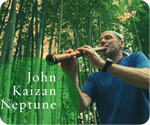

A Free E-Newsletter for Friends of Japan & Teachers of Japanese

Greetings!
Greetings! I am writing this message in my office surrounded by lots of cardboard boxes as we are moving to the temporary office for a few months. From now until the time we will come back to the current location in August, we will keep ourselves busy organizing many projects with our outside partners. We will be inviting a California-born Shakuhachi (bamboo flute) master from Japan to jazz up Little Tokyo with a performance of his eclectic music in a club setting, along with a family fun workshop on the making of bamboo musical instruments.
Fashion is another great topic of interest for us this year as we hold a lecture inviting a Japan based expert on the history of Japan-US cultural exchanges on fashion. In July, we are planning another lecture and workshop featuring a washi (Japanese paper) thread spinner and weaver.
While busy with our move, we have encountered some good news that several past participants of JET-MIP (JET Memorial Invitation Program) have been accepted by the JET (Japan Exchange and Teaching Program) program and will be going to Japan to teach. It is great to know that they have kept their interest in Japan throughout their college years and chose Japan as the location for their first job. More power to the young and adventurous!
Sincerely,
Hideki Hara, Director


The Japan Foundation, Los Angeles is proud to bring the shakuhachi (bamboo flute) master, John Kaizan Neptune from Japan and present a bamboo music instrument making workshop for kids. Participants can learn the craft of making a bamboo instrument and also enjoy playing it with master John Kaizan afterwords.
He tries to renew contact with his beautiful ex-wife Kyoko (Yoko Maki) and in a stormy summer night sheltered at his mother's home with his family he attempts to take back control of his existence and to find a lasting place in the life of his young son Shingo (Taiyo Yoshizawa). Ryota reaches an understanding on his family life and uses the chance to bond with his son and tries to make memorable experiences he had with his father as a child with his son before time and place for it passes over. (Wikipedia)

John Kaizan Neptune is widely acknowledged to be among the top masters of the shakuhachi, or Japanese bamboo flute. Well-known in Japan, this California native is also an accomplished jazz artist and composer who has gained respect in both the East and West for his versatile and technically sophisticated melting pot of sounds.

Tokyo-based writer W. David Marx will talk through his book on the development of menswear in Japan and how Japan now exports their own premium take on American classics like denim, Ivy League clothing, and street wear to the rest of the world.


The following Fiscal Year 2017-18 grant programs are still available to support Japanese-Language Education in the United States.


As the summer draws near, what better way to encourage Japanese learning than through summer reading in Japanese? And one tried and tested way to develop learners’ Japanese reading skills is through tadoku, or extensive reading. As the name suggests, those engaged in tadoku read a large amount of materials, be they novels, children’s books, manga, or something else. Tadoku itself has been gaining much attention among teachers of Japanese, and at the most recent 2017 AATJ spring conference in Toronto, it was noted that many students themselves want the opportunity to read more books. As a result, Japanese teachers have been building up their own tadoku collections for their students, separating their books into graded levels to allow students to find the right book for themselves.
So how does tadoku work? The guidelines are simple:
Essentially, tadoku is student-centered. Because the book’s difficulty level and subject are self-selected, the student feels more in control of his or her engagement with the Japanese language. And because students are reading extensively, they can explore the rich field of Japanese literature. There is still a vast abundance of works in the original language that have not been translated; there is still a lot to discover.
Thus, by taking control of their own direction, expanding their reading skills and exploring Japanese literature, students will be able to find stories from Japan that relate to them, or with which they can empathize. Tadoku is one means in which to steadily introduce the diversity of Japan, and through the variety of stories, whether through manga or light novels or regular novels, people can form a new connection to Japan. No matter how different the characters in the pages may seem from oneself at first, there will be something there, something that speaks to our human universality, a feeling or idea that we can share with someone else; it is from this that we can even create cross-cultural dialogue. That is the beauty of reading. And tadoku can help us discover this.

The Japan Foundation offers two training programs, one for specialists in a cultural or academic field at our Japanese Language Institute in Kansai as well as another for Japanese language teachers at our Japanese Language Institute in Urawa. For the current fiscal year, we will be providing four postgraduate students with the opportunity to train in Kansai and two Japanese language teachers to train in Urawa. We hope they are able to make good use of their time in Japan and hope to hear about their experiences in a future issue of Breeze. For information on the 2018-2019 program cycle, please check back in October.
Short-term Teacher Training Program (June 27 to August 17)
Project-based Training Program (November 7 to December 6)
Japanese Language Program for Specialists (Short-term: June 7 to August 2)
Japanese Language Program for Specialists (Long-term: October 4 to April 4, 2018)

It has been six years now since we sent the first group of participants on the JET Memorial Invitation Program and some of the past participants have graduated from college and have already gone through the application process for JET. If you remember, this program was launched immediately following the 2011 Great East Japan Earthquake and Tsunami to commemorate the lives two American JETs that were lost during the disaster. This year, four past participants of JET-MIP (Christopher Mahmood, 2011, Hokkaido Prefecture; Andy Juarez, 2012, Kochi Prefecture, Sarah Wade, 2012, Yamanashi Prefecture; and Kelly Kratz, 2013, Hokkaido Prefecture) were accepted into the JET Program, following in the footsteps of Taylor Anderson and Montgomery Dickson. They will be acting as cultural ambassadors in the cities they are assigned to promote international exchange and good will between two countries that have had a long and enduring relationship in the global community.

We are sad to announce that Ayako Bessho will be leaving the Japan Foundation, Los Angeles at the beginning of June and will be returning to Japan after completing three long years of service here. During that time Ayako took over the J-LEAP program and continued to develop it to support Japanese language teachers in the US. She also assisted in managing the JF Nihongo classes here in Los Angeles. We wish her the best of luck wherever she lands.